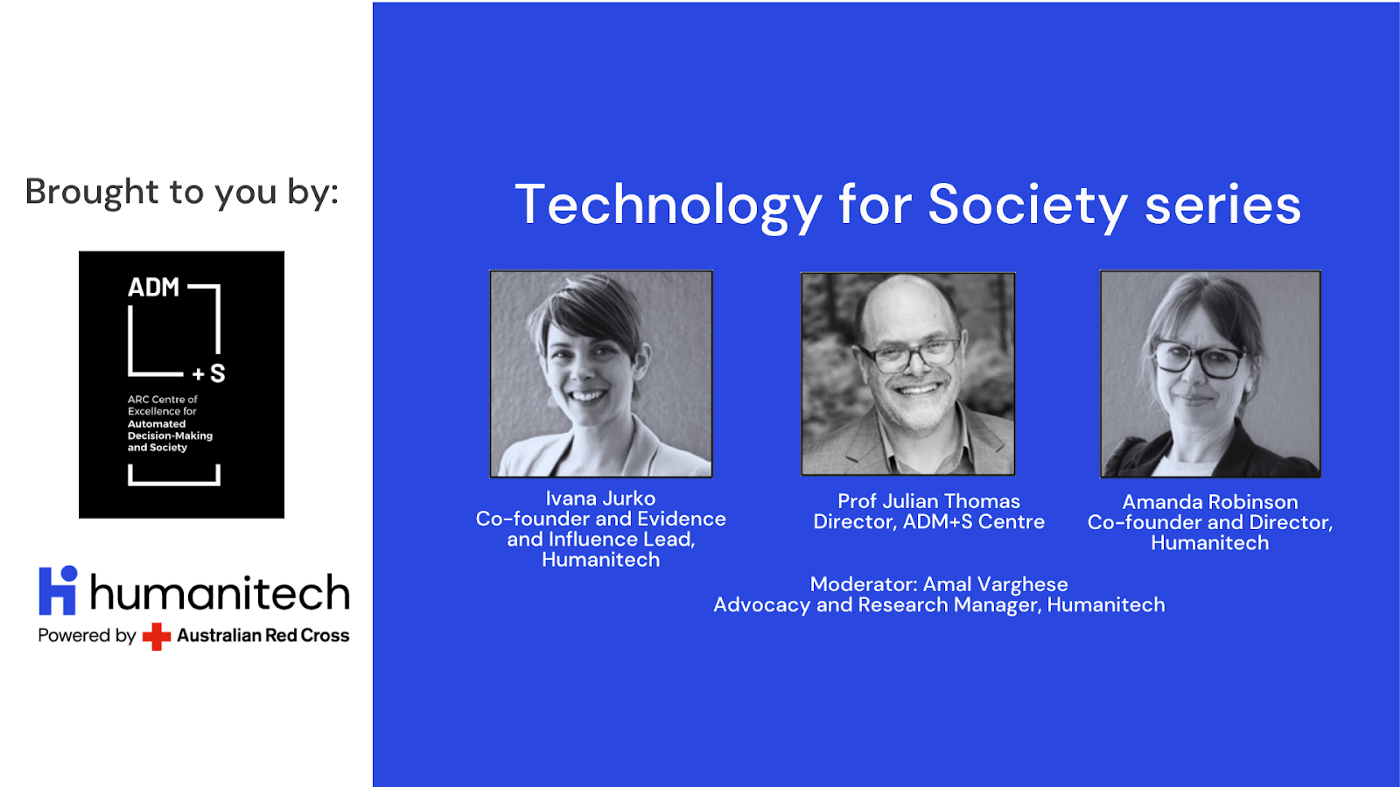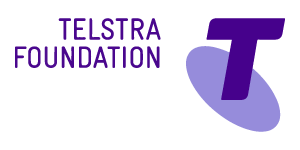
Technology for Society series: a partnership promoting the responsible use of frontier technologies
22 February 2022
Technology for Society series: a partnership promoting the responsible use of frontier technologies
Humanitech, powered by Australian Red Cross, and the ARC Centre of Excellence for Automated Decision-Making and Society (ADM+S) have partnered to launch a series that brings together researchers, humanitarians, and industry leaders to discuss the critical issues emerging at the intersection of humanity and new technologies.
The Technology for Society series convenes the best minds working at the forefront of technological and social innovation to explore what it means to design and build responsible, ethical, and inclusive frontier technologies.
Holding discussions between academics, industry, and humanitarian leaders, the series will untangle big questions on the potential impacts of new technologies on humanity — and how we can identify and amplify the very best solutions for the good of all.

The series launched on 30 November 2021 with a panel discussion between Amanda Robinson, Co-Founder and Director of Humanitech, Ivana Jurko, Co-Founder and Evidence and Influence Lead at Humanitech and Distinguished Professor Julian Thomas, Centre Director of ADM+S. Highlighting the shared value in the partnership between Humanitech and the ADM+S Centre, the panelists explored the need for a strong cross-sector approach to address the unique social challenges and opportunities emerging from frontier technologies.
“Social impact is not the domain of one organisation or even one sector,” said Amanda Robinson. “What will be most effective is to lead across sectors, across disciplines, across industries, across perspectives to really understand these problems deeply and to work towards a new business as usual.”
Distinguished Professor Julian Thomas shared the practical benefits of partnerships for researchers, who “often get our best ideas from talking to people in organisations like the Red Cross and Humanitech.”
“There is an understanding of the contingencies, the problems, the challenges that arise on the ground and that inspires [researchers] to reframe our questions, to go back to the problems and to rethink our research programs,” he continued. “It’s that sort of complex collaboration that we enjoy with Humanitech and the Red Cross.”
The strategic partnership between Humanitech and the ADM+S was cultivated to inform research and ensure ethical and streamlined industry processes. The teams are working together to develop systems and frameworks to ensure the responsible, ethical, and inclusive design and use of frontier technologies.
Ivana Jurko believes that it is essential that humanitarians engage in the issues arising from technological advancement to ensure that human dignity and safety is promoted and protected.
“It’s not a question of whether these technologies are coming our way — they’re part of our work already. They’re affecting our communities in different ways, so we actually have a duty to be part of the conversation.”
As emerging technologies continue to become embedded in many communities, the panel believe this highlights a current skills gap: a technologically savvy workforce that understands the social aspects of these technologies, and has strategies to mitigate their potential risks and maximise their benefits.
Amanda Robinson highlighted the benefit of tertiary education providers who are meeting this need, such as at the College of Business and Law at RMIT University, who provide training on the social implications of technology within their courses.
“[We’re] starting to see these subjects built into business degrees, like social impact, social innovation, responsible technology, ethics,” she explained. “We’re really starting to see how the future generation of business leaders are being trained and coached in different ways of thinking about the future — and that’s so important.”
About
Distinguished Professor Julian Thomas is the Director of the ARC Centre of Excellence for Automated Decision-Making and Society and a Distinguished Professor in the School of Media and Communication at RMIT University. He is a researcher in digital media and the internet, with particular interests in communications and information policy, digital inclusion and inequality, and the history of communications technologies. Julian’s recent work includes the Australian Digital Inclusion Index (2016–2020), Internet on the Outstation (Institute of Network Cultures, 2016), and The Informal Media Economy (Polity, 2015). Julian is a member of the Council of the Australian Academy of the Humanities, a Board member of the Australian Communications Consumers Action Network (ACCAN), and an Advisory Board member of Humanitech, an initiative of the Australian Red Cross.
Amanda Robinson is the Co-founder and Director of Humanitech and is based at Australian Red Cross. Amanda has a keen interest in how frontier technology might help to solve complex social problems and drive humanitarian outcomes at scale. Prior to Australian Red Cross Amanda has held senior roles developing and managing online products and marketplaces for SEEK, Yahoo, Lonely Planet and Sensis. Amanda holds a Bachelor of Arts from University of Melbourne, a Masters of Marketing from Monash University and a Graduate Certificate of Social Impact from the Centre for Social Impact.
Ivana Jurko is the Co-founder and Evidence and Influence Lead at Humanitech and is based at the Australian Red Cross. Ivana is also a Partner Investigator at the ADM+S Centre, looking to connect the ADM research community with humanitarian practice. She is also a PhD candidate at RMIT University. Ivana has over 15 years’ experience in the social sector, and has previously worked at Oxfam Australia, Headspace, and Beyondblue. Ivana’s areas of practice include social policy research, humanitarian futures and foresight, and design and delivery of complex social initiatives.
Humanitech is an initiative of Australian Red Cross that aims to shape the future for all humanity by harnessing the power of technology for good. Join our movement through Humanitech’s Slack Channel or follow us on Twitter.
The ARC Centre of Excellence for Automated Decision-Making and Society (ADM+S) brings together universities, industry, government and the community to support the development of responsible, ethical and inclusive automated decision-making. Follow us on Twitter.

